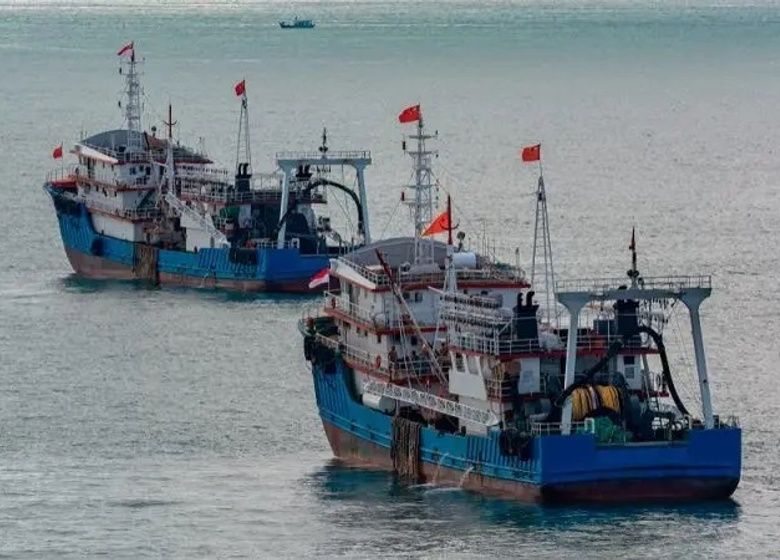Decades of overfishing, unsustainable fishing practices, and illegal fishing have severely impacted fishery resources in the Gulf of Guinea. While foreign vessels are the main contributors to this depletion, Chinese operators are accused of being the primary culprits of this plundering.
2,500. That is the official number of high-seas fishing vessels claimed by Beijing. However, according to the FAO, this number could be as high as 17,000, making China the largest fishing fleet in the world. This distant-water fleet has set its sights on the Gulf of Guinea, home to some of the richest fishing waters globally, for several decades. The method of operation is well-known: bottom trawling.
Bottom trawling involves dragging a fishing net along or very close to the seabed to capture fish that live on the ocean floor. In other words, it is an extremely destructive form of fishing that sweeps everything in its path.
According to Greenpeace, over 400 Chinese fishing boats currently operate off the coast of West Africa, generating an annual revenue of more than 400 million euros, mostly through illegal, unreported, and unregulated (IUU) fishing.
The West African region alone, according to the NGO, hosts over 70% of the Chinese fishing vessels scattered along Africa’s coastlines. The Environmental Justice Foundation (EJF) asserts that at least 90% of the industrial trawlers operating in Ghana belong to Chinese companies.
Disastrous Consequences
For Chinese vessels, industrial fishing is just another economic activity, but for coastal populations, it represents a significant loss of income.
By operating illegally relatively close to shore, Chinese industrial trawlers directly compete with artisanal fishing. This is especially troubling since fishing generates substantial income for artisanal fishermen, women who process or dry small fish, and local merchants.
According to the report, « Breaking Point: How Bottom Trawling is Accelerating the Collapse of Artisanal Fishing in Senegal, » published in October 2023 by the EJF, bottom trawling, particularly controlled by Chinese operators, has already had tangible impacts on the ground.
The study found that 65% of the artisanal fishermen interviewed reported earning less today than in 2018, and the majority noticed a reduction in the volume of their catches over the past five years. In Benin, for example, official data shows that vessels involved in IUU fishing, mostly Chinese, result in annual economic losses of around 2 billion CFA francs for the fishing sector, which contributes 3% of the GDP.
In addition to jeopardizing income, illegal Chinese vessels threaten food security in the West African region by massively exporting species that are consumed locally.
« They [Chinese trawlers] are decimating a specific area of the oceans by taking fish out of the hands of artisanal fishermen in West Africa. Some fishermen can no longer fish to feed their families, » said Vanda Felbab-Brown, co-director of the African Security Initiative at the Brookings Institution.
The EJF also reports that 88% of fishermen and 93% of fish processors have cited limited access to fish for their own consumption. This is a critical situation in Senegal, where fish contributes over 50% of the animal protein intake, much higher than the global average of around 20%.
On another front, the illegal incursions of Chinese trawlers into areas reserved for artisanal fishing often result in frequent destruction of local fishing gear in several Gulf of Guinea countries.
Taking Strong Action
Every year, the plundering of fisheries results in an estimated loss of about $2.3 billion per year for West Africa, according to a report published by the International Investigative Journalism Network (Ij-Reportika).
This alarming context demands a collective regional effort. Measures such as strengthening investments in monitoring and control systems, as well as regular and comprehensive assessments of catches and landings, exist to mitigate the overexploitation of fish stocks in the region.
In 2017, the Fisheries Transparency Initiative (FITI) was launched to collect data on the number of vessels licensed to fish in territorial waters. The Seychelles and Mauritania have already published their reports. Other countries in the region will need to follow suit.
Source: banouto




